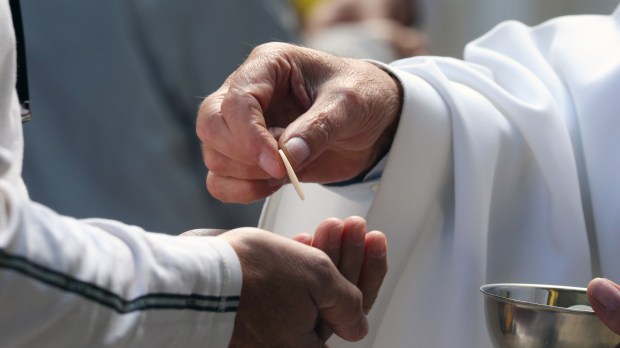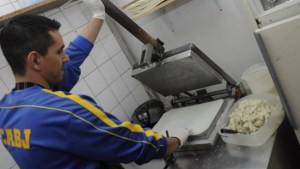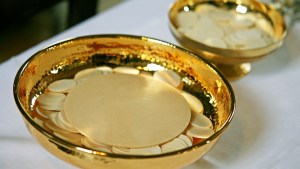Three young Muslim men from Africa (Sadia, Madi and Adama) and a Catholic Italian (Umile) walk into a business that makes hosts for Mass.
It sounds like the unlikely beginning of a joke. Instead, it’s an improbable true story of beauty that begins on a boat from Libya and ends (or rather, begins again) under the bell tower of the Cathedral of Our Lady of the Assumption in Cosenza, Italy. Here, artisan and merchant Umile Trausi works in his store of religious articles and makes high quality wafers for use at Mass.
Trausi uses an old recipe with simple ingredients (as required by Church law), and an electric mold that cooks no more than 30 hosts at a time.
“I produced them here in Cosenza until 1992,” Trausi tells the Italian edition of Vanity Fair. “My wife and I worked even at night, one ladle after another, to meet the demand. Then we got tired, and the industrial wafers arrived, where you put the bag of flour on one side and on the other you get the envelopes already closed. They come from Poland, but they’re not the same when compared to the artisanal ones.”
Produced through solidarity
What does it take to make a wafer that can be used as a host in Mass? Flour, water and a bit of craftsmanship. This artisan also wanted to add a pinch of solidarity. After all, the Body of Christ is bread broken for everyone, so he feels there’s no better way to prepare it than to employ three young men of Muslim faith. A strange form of solidarity and unity between religions!
“Yes, I’m a Muslim, but I have no problem doing this work,” says Madi, 20. “In fact, I see it as an opportunity to thank the religion of (Italy), the country that welcomed us,” he told Vanity Fair.
Madi is Senegalese, and the other two apprentices are from the Ivory Coast. They all embarked from Libya, each with a different story and the same dream.
Madi was an economics student, who “left because I wanted freedom and new opportunities.” When he arrived in Italy, he attended a course for the production of fresh artisanal pasta and then an internship in a supermarket that offered him a job, “But I’m very focused on the project of the pasta factory and the hosts. If I came to Italy, it’s to do something I believe in, to fulfill myself as an entrepreneur,” he told the magazine.
A cooperative aimed at independence
The project is a cooperative named SAM, an acronym of the initials of the names of the three young entrepreneurs. It started with 1500€ (almost $1700 US) of capital financed by the Foundation with the South, together with the New Families Association and Action for a United World.
Salvatore Brullo, general manager of the Sicilian cooperative Fo.co and the leader of the project, told Vanity Fair that the market for hosts is competitive, but there’s also a high demand. While the production of hosts was originally carried out by nuns, the situation has changed due to the crisis of vocations, industrialization, and globalization.
Large industries arrived and exported them all over the world, but there’s still room for a quality niche product, made with artisanal flours and with the added value of three young Muslims willing to create the symbol of the Christian religion.
It’s beautiful to discover that that host is still something that feeds not only the soul of those who receive it with devotion at Mass, but also those who produce it with love and patience and are proud to do so—not in the name of a shared belief, but of reverence and respect for another religion and a symbol of which we are often not as proud of as these three Muslims.
Unlikely, perhaps, but not impossible
“I have so much desire to work, I know I will succeed. Hopefully, with the hosts, your God will help us, too,” says Sadia, 21, who bears scars from his past on his arms and legs and, probably even more so in his heart.
These young people have made preparing the bread for the body of Christ into anopportunity for life and redemption. Let us then, who believe that the host becomes more than flour and water, remember to make it an opportunity for eternal life whenever we can.
It seems like an improbable joke that three Muslims, amidst monstrances and vestments, decided to become producers of hosts. But then again, we Catholics are used to believing against all odds in impossible miracles, even when all seems lost.



